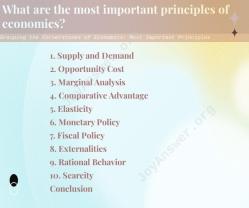What are the core principles of economics?
Economics is a fundamental field that studies the allocation of resources, decision-making, and the behavior of individuals, businesses, and governments. In this guide, we will explore the essential core principles of economics and gain valuable insights into this dynamic discipline.
Key Principles of Economics
- Scarcity and Choice: Resources are limited, and individuals, businesses, and societies must make choices about how to allocate these resources to meet their needs and wants.
- Opportunity Cost: Every choice involves giving up an alternative option. The opportunity cost is the value of the next best alternative forgone when a decision is made.
- Supply and Demand: The interaction between supply, the quantity of a product available, and demand, the desire for that product, determines its price and quantity exchanged in the market.
- Cost-Benefit Analysis: Decisions are made by evaluating the costs and benefits associated with different choices. A choice is considered rational when the benefits outweigh the costs.
- Incentives: People respond to incentives, which can be monetary or non-monetary, and influence their behavior and decision-making.
- Competition: Competition among producers results in efficiency, innovation, and better products and services for consumers.
- Trade and Comparative Advantage: Countries can benefit from trade by specializing in producing goods and services in which they have a comparative advantage.
- Markets and Prices: Prices are determined by the interaction of supply and demand in competitive markets.
- Economic Systems: Different economies organize their production, distribution, and consumption of goods and services through various economic systems, such as capitalism, socialism, and mixed economies.
- Macroeconomics and Microeconomics: Macroeconomics studies the economy as a whole, including factors like unemployment, inflation, and economic growth. Microeconomics focuses on individual markets and consumer behavior.
Insights from Core Economic Principles
Understanding these core economic principles provides valuable insights into how individuals, businesses, and governments make decisions and interact within the economy. These insights have real-world applications in various fields, from business strategy and public policy to personal financial management.
Applying Economic Thinking
Embracing economic thinking helps individuals critically assess situations, evaluate trade-offs, and make informed decisions. It encourages a deeper understanding of economic concepts and their impact on daily life and society.
Conclusion
Embracing the core principles of economics empowers individuals to navigate the complexities of decision-making, resource allocation, and market interactions. Whether analyzing supply and demand or considering opportunity costs, these principles offer valuable tools for understanding and thriving in the dynamic world of economics.



